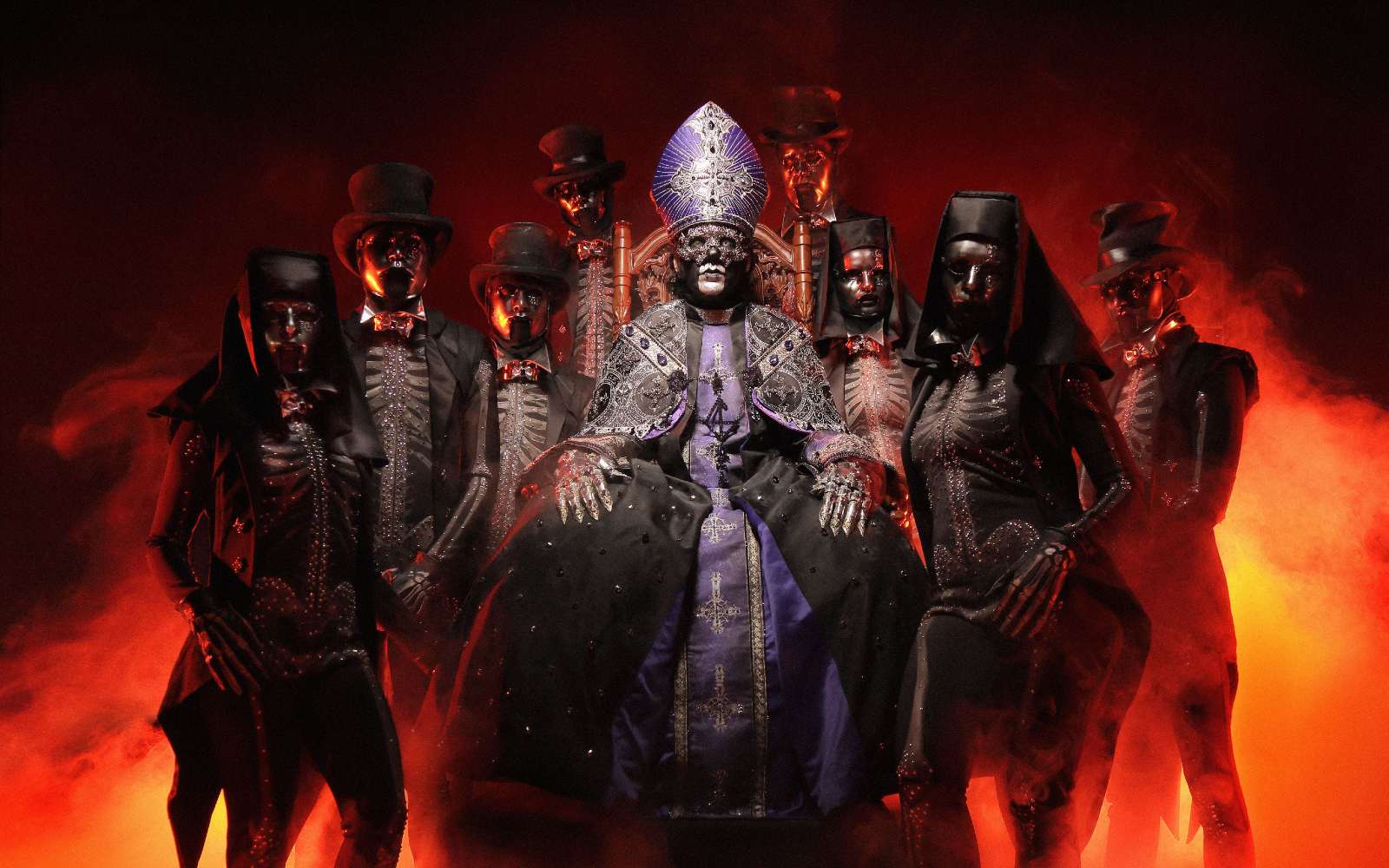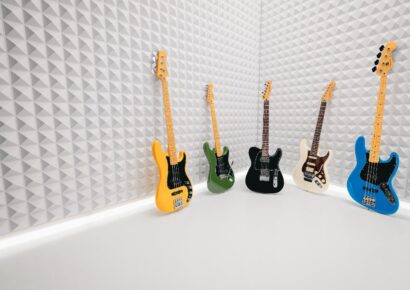Ghost are back with a ~new~ frontman and a new record due out later this month.
Tobias Forge is the frontman of Ghost, who’ve evolved from doomy, alternative rock into all-out anthemic stadium rock superstars. Known worldwide for their stage production, album concepts and the revolving door of frontmen; characters devised by Tobias who he takes the shape of for the tour and promotion of each record.
The forthcoming album Skeletá sees the arrival of newly anointed Papa V Perpetua, Skeletá being Ghost’s sixth full length studio album and one that comprehensively captures the expansive list of influences that Tobias has; but what comes first? Does the concept inform the music or is it the other way around?
“When it comes to making a record, I’ve never gone into the first song with a clean slate,” explains Tobias. “There’s always a— I don’t want to call it leftovers, but there’s definitely a starting point.” he says, referring to unfinished songs that didn’t make the cut of the previous record.
Read all the latest features, lists and columns here.
“Something in the material that hasn’t been used for a previous work, this sets a standard first— you have to start somewhere and in this case making Skeletá, the song that became “Satanized”… if you heard the demo from 2020 you would instantly recognise the song.”
Tobias explains that the shuffle feel of “Satanized” felt right, but it ticked a box in terms of making a comprehensive and cohesive body of work, explaining that he’s filled the role of a shuffle song, and a picture begins to form with gaps to fill, i.e. a heavier song, a ballad etc.
“Every new song feeds info about the rest of the content, and sometimes you’ll come up with a new song, for example ‘Song #7’ that pushes out ‘Song #3’, and all of a sudden you need to come up with a new ‘Song #7’ because it’s down to #6 [songs] again.”
Tobias compares writing a Ghost record to a Rubik’s Cube, sometimes having to jumble up your progress in order to move ahead, all in the interest of finishing the puzzle or project.
“Then conceptually, having written IMPERA that was shining a light onto outward factors like societal structures, I knew when I made IMPERA that I want to make another record that is completely— not devoid of criticism if you will, but the challenge was to make a whole record where there’s a certain degree of introspection going on.”
“It felt like a natural step after IMPERA, because I didn’t want to write an IMPERA II.”
Tobias is focused on an album’s ebb and flow, taking listeners on a journey, allowing a Ghost album to work as a whole cohesive project. Their sound has evolved over a few records, but Tobias comes back to the foundation of a song.
“You can write a song really quickly, and then of course you’re working on the minute of a track in detail up until the last second of mixing and mastering, basically.” he explains. “So there are things that can change, even though the basic recipe is the same.”
“It’s like meat and potatoes and sauce, that’s as simple as that. But you know how big a difference there can be in meat and potatoes and sauce, depending on who’s cooking it.”
“I know some artists that are almost helpless in their orchestration,” says Tobias. He refers to Bob Dylan here, whose music is so bare bones, a sonic signature, that it’s difficult to add too much on top of without drawing criticism. Tobias also refers to Ulf Lundell, an artist that he likens to the Swedish version of Bob Dylan or Bruce Springsteen.
“[Lundell] would come into the studio with a bare bones, strummed version of the song, and then the band comes in and makes it a big rock song.”
Tobias Forge
All of this is to say that Tobias absolutely does not work this way with Ghost, his ideas spawning from the core idea, though he begins to imagine and write the rest of the ensemble immediately.
“I’m much of a producer that way, but if I were producing another band I would implement the same methods. Not only how to write songs, but I would think conceptually of a record the same way.”
“The album starts at 0:00 and ends at 43:00, right?” he muses, and continues to discuss that the task at hand is filling the 43 minutes between start and finish with a journey for the listener.
A bare bones arrangement, however, is easy to produce live. Ghost’s anthemic, expansive productions are no mean feat, though Tobias has this in mind while writing and producing albums.
“There’s awareness,” he says. “I’ve always intended to practically arrange the songs so you can play it, but I think more so now when I know more practical solutions to orchestrating the song— how will this translate into an arena? And I don’t think that I’m unique in that, I think it happens to most band that play from clubs to theatres to arenas. Had Metallica gone to arena status at Kill ‘Em All, they might not have written “Master of Puppets”, they might not have written “Battery”.
“There’s a natural ambience [in an arena] that music over a certain tempo has a tendency to sound like a wreck in a bigger environment. I think that’s the same reason why even Iron Maiden does not play every song that they have— you play the songs that work, and flow ith the crowd and it’s a give and take.”
Tobias discusses further his relationship with the crowd, their enjoyment feeding his own happiness, and if he insisted on playing songs that don’t translate in an arena setting, the crowd wouldn’t enjoy it as much and vice versa.
“It’s much more fun to cook for someone that enjoys it, right? Rather than like ‘Oh, hm, this is an acquired taste!’” he says with a chuckle. “What kind of chef is that?”
“I think that the idea that anyone reading this, scoffing at the idea of writing for someone else, has kinda lost the point.”
Tobias continues, diving deeper into the details of writing and recording Skeletá, explaining that some tracks on the record remained through demo stages and were recorded on the day he wrote the song.
“But then there are other things recorded a year later on the day we were mixing.” he says. “There is a song on the record, “Cenotaph”, that was in the demo phase— that was written and done with lyrics and everything, the top line was all there, it had a really complicated arrangement.”
“It was really orchestral, like Queen, and it had already moved from demos to the real studios. I had one of those chills down my spine, where something had been troubling me for weeks and weeks and weeks, ever since we finished the demo.”
Tobias goes on to explain that after this chill he had approached Max Grahn, a collaborator, songwriter and producer involved in recording with Ghost, telling Max that he felt very strongly that “Cenotaph” needed to be re-recorded. It was too complicated, the lyrics were too profound.
“It was like killing a darling,” Tobias states. “I was the one who wanted it to be complicated that way, that was my idea.”
Tobias’ stroke of genius was this: he did a cover of “Cenotaph” with the intention of re-working the song into something more cohesive for the record. Excitedly, Tobias tells me they recorded this at Atlantis Studios, the same studio that ABBA performed Dancing Queen, and he recommends I check out the YouTube video of that performance. “That’s the room that were were in. Same console, same microphones, same room.”
“I said ‘Let’s make it really simple, same melody, same chord progression, but let’s make it Meatloaf, boogie woogie, Status Quo, ZZ Top— and let’s see if it holds, if it carries its weight that way.’ And half an hour later, we re-recorded everything in an oversimplified way. And that song, every time we played it in the studio, everyone started smiling.”
To wrap up, Tobias explains a bit about the mixing process for Ghost, though admits that he’s always focused on getting things right at the source.
“If I were more of an engineer, which I am not, I might’ve been better at it.” he says, referring to his ability to navigate the software and digital world of recording. “There’s a discrepancy between what I know that the program can do, and knowing how to do it.”
Tobias explains how frustrated he gets having ideas that he can’t bring to fruition without navigating a menu or installing an update.
“I’ve been blessed with so many engineers,” he explains. “And therefore I know I cannot become that great of an engineer, but if I were an engineer, my mixing process would start second one, because I hate working not knowing what we’re doing.”
The new album from Ghost, Skeletá, is out April 25 via Loma Vista Recordings.

